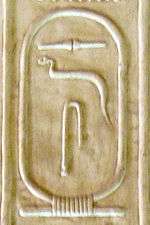Sedjes
Sedjes is an Ancient Egyptian cartouche name of a king (pharaoh), who is said to have ruled during the 3rd dynasty (old kingdom period). The name appears only once, in the Abydos King List, as cartouche No.18. It is presented as the direct follower of king Sekhemkhet (here named Teti) and as the direct predecessor of king Neferkare I..[1]

In the 19th century it was thought by Egyptologists and Historians to be the name of a king, because the scribes had placed the word sedjes inside a royal cartouche. But as knowledge about Ancient Egyptian phrasing and grammars advanced, scholars realized its true meaning. Sedjes means "omitted" or "missing" and the scribes used the word as a pseudonym replacing a now illegible name of a king. They encircled it with a royal cartouche to mark it as a king's name, but following generations of scribes erroneously took it as the actual birth name of the to-be listed king. A similar case can be observed with the ominous cartouche name Hudjefa, also used as a pseudonym for missing royal names. Today, it is passionately disputed, which king of 3rd dynasty was meant to be named in cartouche No.18.[2][3][4]
References
- Wolfgang Helck: Untersuchungen zur Thinitenzeit (= Ägyptologische Abhandlungen (ÄA), vol. 45). Harrassowitz, Wiesbaden 1987, ISBN 3-447-02677-4, p.109.
- Herman Alexander Schlögl: Das Alte Ägypten: Geschichte und Kultur von der Frühzeit bis zu Kleopatra. Beck, Hamburg 2006, ISBN 3-406-54988-8, page 78.
- Iorwerth Eiddon Stephen Edwards: The Cambridge Ancient History Vol. 1, Pt. 2: Early history of the Middle East, 3rd volume (Reprint). Cambridge University Press, Cambridge 2006, ISBN 0-521-07791-5, page 35.
- Jürgen von Beckerath: Handbuch der ägyptischen Königsnamen. Deutscher Kunstverlag, München/Berlin 1984, page 49.